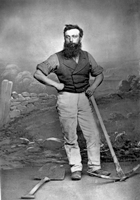In Kirkconnel Old Churchyard Poem by Alexander Anderson
In Kirkconnel Old Churchyard
Each in his narrow cell forever laid,
The rude forefathers of the hamlet sleep.—
Gray's Elegy
The mist lies on Glen Aymer hill,
Listless as if asleep,
Below the silence quivers still
With bleatings of the sheep.
I hear the curlew's sudden call,
The lapwing follows suit;
The little streamlet's tiny fall,
The distance makes half mute.
Afar upon the hills I hear
The shepherd's whistle keen;
A dog's bark faintly strikes the ear
From uplands fresh and green.
And here, beneath the summer sky,
With all my thoughts at rest,
The sunshine falling from on high
On brow and face and breast
I lie, within the old churchyard
Of fair Kirkconnel town,
Where simple names can yet be read
On stones half-worn and brown.
I take my knife and scratch the moss
From names and dates, to see
A vanish'd time restore its loss
And hold converse with me.
O wondrous dates that find a tongue,
And ever speak in strange
Sweet syllables, distinctly sung,
The mystery of change!
Close by my feet, half-hid in grass,
The skull and cross-bones peer,
For man, where'er he lives, must pass
To death by symbols drear.
O mighty mystery, unread
By sage's tongue or pen,
The sloping sunshine overhead,
Beneath the bones of men!
I rise and pace the narrow round,
Then come like one in search,
And step across the circling mound
That marks the vanish'd church.
Within the mound I lie, and see
Before me in the wall
The narrow gate that used to be,
Ere time had wasted all.
Now, if within my dreaming brain
The German Uhland's pow'r
Could be, then would I paint again
That Sabbath and that hour;
Or, if this tree whose shadows bland
Are on my face, could be
A voice to whisper things, and stand
A talking tree to me.
But, hush! my eyes are softly shut
By gently-falling beams,
And underneath their lids are put
The germ of noonday dreams.
O wondrous mystery, unread
By tongue of sage or pen,
The happy sunshine overhead,
Beneath the dust of men!
I sleep, but all my pow'rs are fix'd
Upon a space half-clear,
Where, partly with dim shadows mix'd,
Faces rise up and peer.
Then floats the psalm upon the air,
And all the place around
Is breathing worship everywhere,
And drinking in the sound.
I, too, join in the soothing song,
And in the solemn prayer;
I bow together with the throng
That meet to worship there.
The homely face of sire and wife
Glows as upon their ear
The promise, quieting all strife,
Falls soft and sweet to hear.
O faces full of trust and love,
O looks that had no doubt,
My heart beat like a saint's above,
And grew at once devout!
Beside me aged mothers bent,
Whose lives had reach'd their term;
And one sweet bride in fondness leant
Upon her husband's arm.
I saw the blushes on her cheek,
The light within her eye,
The thoughts that were too fond to speak,
But utter'd in a sigh.
Sweet maidens in their bloom were there,
Within whose drooping eyes
The sun of dawning love was fair,
As stars within the skies.
And youths, strong limb'd, with frank, bold look,
That seem'd to pierce beyond
The future darkness, and rebuke
Aught wishing to despond.
And still the white-hair'd pastor's voice
Fell on the ear, and still
A curlew would make sudden noise,
And swoop around the hill.
But now they rise with bended head,
The old and young to hear
The simple benediction said
In reverential fear.
Then through the gateway open'd wide
They take their winding way—
Sire, mother, bridegroom, and sweet bride,
Youth, maid, and children gay.
Last came the pastor, and I saw
His white hair in the wind
Move, as he turn'd in holy awe
And left the church behind.
Then all the silence came again,
And, for the want of sound,
I woke: my heart was full of pain,
And sadly I look'd round.
I heard the swaying of the tree,
I saw the grasses wave,
By fits on either side of me,
Above each lonely grave.
The sheep were on the mountain side,
Dotting its breast like snow;
I heard the low of kine, descried
In meadows far below.
'O dead!' I said, 'sleep on and rest
In all thy quiet here;
The great world, in its eager quest,
Can never come anear.'
But, lo! from out the distant vale
An engine's whistle keen
Comes sharply up, as to assail
The silence that had been.
O mighty mystery, unread
By tongue of sage or pen,
The change that rolls with iron tread
Above the dust of men!
This poem has not been translated into any other language yet.
I would like to translate this poem